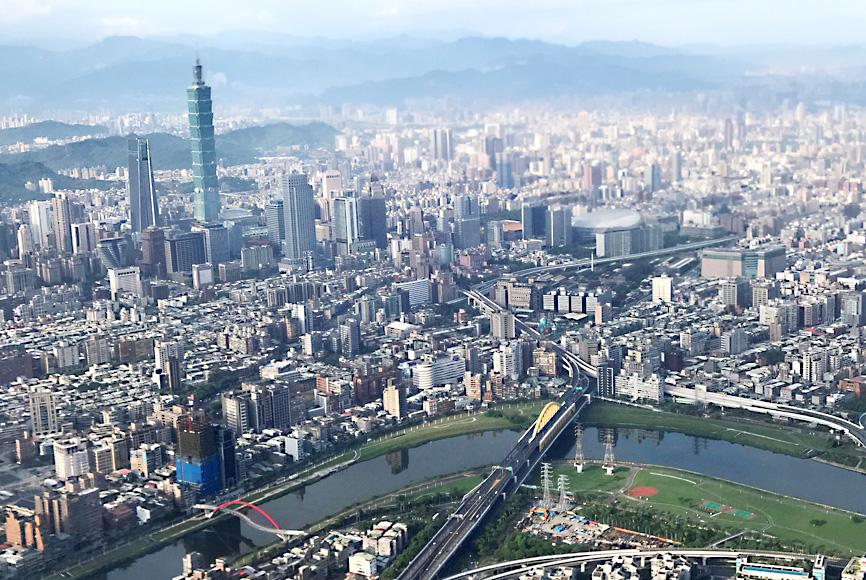Taiwan’s economy expanded a mild 1.54 percent last quarter from a year earlier, thanks to government spending and private investment, as the COVID-19 pandemic affected consumer activity, the Directorate-General of Budget, Accounting and Statistics (DGBAS) said yesterday.
The growth rate missed the agency’s forecast in February by 0.26 percentage points and was the lowest in 15 quarters, as Taiwan was not spared the impact of the pandemic, which has infected 3.2 million people globally and killed more than 228,000.
“The coronavirus has hurt the economy harder than expected after spreading across Europe and the US,” National Income Section head Yu Ming-chun (游敏君) said.

Photo: Tyrone Siu, Reuters
Asked about forecasts for full-year growth, Yu said the agency would give an update later this month.
The seasonally adjusted annual rate shrank 5.91 percent, suggesting heightened risks of a technical recession if the gauge stays in negative territory for two straight quarters.
The quarterly report indicated that government expenditure increased 3.67 percent annually during the January-to-March period, contributing 0.48 percentage points to GDP growth in the first quarter, while capital formation rose 3.13 percent, adding 0.73 percentage points to GDP.
The “mild outbreak” in Taiwan allowed local manufacturers to maintain normal operations and win order transfers from foreign peers that were hit by temporary shutdowns, the report said.
That helped support a 3.67 percent increase in exports and a 3.13 gain in imports in the quarter, adding 0.86 percentage points to net external demand, beating expectations, Yu said.
Major technology companies are ramping up production to meet demand for next-generation consumer electronics, but non-tech companies are struggling amid a crude oil price rout, the DGBAS said.
Service-focused firms bore the brunt of the coronavirus outbreak, as people stayed home to avoid infections, it said.
Private consumption dropped 0.97 percent, contrary to a projected 0.75 percent increase, despite an 8.18 percent pickup in new vehicle sales and a 16.52 percent jump in e-commerce sales, the report said.
Social distancing and travel restrictions wreaked havoc on restaurants, hotels and tourism-related sectors.
Listed hospitality providers saw revenue tumble 26.21 percent in the first quarter, while restaurant sales weakened 6.59 percent from a year earlier, the report said, adding that outbound tourist visits plunged 49.17 percent year-on-year.
DGBAS Minister Chu Tzer-ming (朱澤民) has said the economy would expand this year, backed by NT$1.05 trillion (US$35.23 billion) in government relief and stimulus measures, contributing more than 5 percent to GDP.
International research institutes have forecast a small recession for Taiwan, partly due to global lockdown measures that would diminish trade flows.

Intel Corp chief executive officer Lip-Bu Tan (陳立武) is expected to meet with Taiwanese suppliers next month in conjunction with the opening of the Computex Taipei trade show, supply chain sources said on Monday. The visit, the first for Tan to Taiwan since assuming his new post last month, would be aimed at enhancing Intel’s ties with suppliers in Taiwan as he attempts to help turn around the struggling US chipmaker, the sources said. Tan is to hold a banquet to celebrate Intel’s 40-year presence in Taiwan before Computex opens on May 20 and invite dozens of Taiwanese suppliers to exchange views

Application-specific integrated circuit designer Faraday Technology Corp (智原) yesterday said that although revenue this quarter would decline 30 percent from last quarter, it retained its full-year forecast of revenue growth of 100 percent. The company attributed the quarterly drop to a slowdown in customers’ production of chips using Faraday’s advanced packaging technology. The company is still confident about its revenue growth this year, given its strong “design-win” — or the projects it won to help customers design their chips, Faraday president Steve Wang (王國雍) told an online earnings conference. “The design-win this year is better than we expected. We believe we will win

Chizuko Kimura has become the first female sushi chef in the world to win a Michelin star, fulfilling a promise she made to her dying husband to continue his legacy. The 54-year-old Japanese chef regained the Michelin star her late husband, Shunei Kimura, won three years ago for their Sushi Shunei restaurant in Paris. For Shunei Kimura, the star was a dream come true. However, the joy was short-lived. He died from cancer just three months later in June 2022. He was 65. The following year, the restaurant in the heart of Montmartre lost its star rating. Chizuko Kimura insisted that the new star is still down

While China’s leaders use their economic and political might to fight US President Donald Trump’s trade war “to the end,” its army of social media soldiers are embarking on a more humorous campaign online. Trump’s tariff blitz has seen Washington and Beijing impose eye-watering duties on imports from the other, fanning a standoff between the economic superpowers that has sparked global recession fears and sent markets into a tailspin. Trump says his policy is a response to years of being “ripped off” by other countries and aims to bring manufacturing to the US, forcing companies to employ US workers. However, China’s online warriors